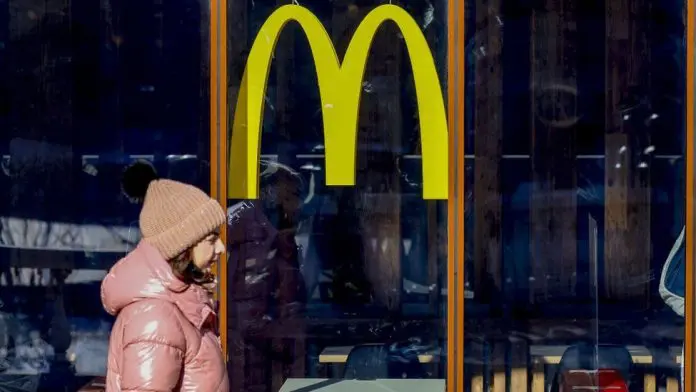McDonald’s has said it will permanently leave Russia after 30 years and has started to sell its restaurants there.
The move comes after it temporarily closed its 850 outlets there in March.
The fast food giant said it made the decision because of the “humanitarian crisis” and “unpredictable operating environment” caused by the Ukraine war.
The chain opened in Moscow in 1990 as the Soviet Union was opening its economy to Western brands and its exit carries similar symbolic weight.
The company said it was now pursuing the sale of all its restaurants in Russia to a local buyer and intended to start the process of “de-arching” the sites so they no longer use the McDonald’s name, branding and menu.
However, it said it would continue to keep its trademarks in Russia.
McDonald’s said owning a business in Russia was “no longer tenable” or consistent with its values.
The chain said its priorities included seeking to ensure its 62,000 employees in Russia continued to be paid until any sale was completed and that they had “future employment with any potential buyer” .
McDonald’s president and chief executive, Chris Kempczinski, said the announcement was “extremely difficult” but it wanted to stick to its values.
“Our commitment to our values means that we can no longer keep the Arches shining there.”
The move comes after Renault announced it was selling its business in the country. The French firm said its 68% stake in carmaker Avtovaz would be sold to a Russian science institute, while its shares in Renault Russia will go to the city of Moscow.
Moscow said Renault’s Russian assets had now become state property – marking the first nationalisation of a major foreign business since the invasion of Ukraine.
When McDonald’s set up shop in Moscow in 1990, it was deeply symbolic – an American cultural icon putting down roots in the heart of the decaying Soviet Union.
Now, it’s leaving – yet another global brand to quit the country as Russia’s war in Ukraine transforms it into an international pariah.
McDonald’s closed its Russian restaurants “temporarily” in March, and now says remaining in the country would not be consistent with its values.
But cynics might point out it only came to that conclusion after facing some pretty vocal criticism on social media, for failing to speak out against the war in Ukraine.
Renault was also initially reluctant to abandon major investments in Russia – until it was name-checked by Ukraine’s President Zelensky in an address to the French parliament.
Now, both companies have bowed to the inevitable.
And those heady days of the early 1990s, when Russia was opening up to the world, seem like ancient history.
Last year Russia and Ukraine accounted for about 9% of McDonald’s global sales.
The chain’s 108 restaurants in Ukraine remain closed due to the conflict but the company is continuing to pay full salaries to all its employees there.
McDonald’s initially faced criticism for being slow to halt its business in Russia, with some calling for a boycott of the company before it suspended operations in March.
Hundreds of international brands, including Starbucks, Coca Cola, Levi’s and Apple, have left Russia or suspended sales there since the country invaded Ukraine in February.
Other firms, including Burger King and Marks and Spencer, say they are unable to close stores due to complex franchise deals.
Source: BBC

